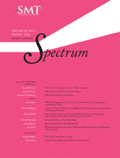
MUSIC THEORY SPECTRUM
Scope & Guideline
Illuminating Insights in Musical Analysis
Introduction
Aims and Scopes
- Interdisciplinary Approaches to Music Theory:
The journal encourages the integration of various disciplines such as psychology, sociology, and cultural studies with traditional music theory, fostering a comprehensive understanding of music in its social and cultural contexts. - Analysis of Diverse Musical Genres:
MUSIC THEORY SPECTRUM encompasses a wide range of musical genres, including classical, popular, and world music, allowing for a rich exploration of music theory across different styles and traditions. - Focus on Contemporary Issues in Music Theory:
The journal addresses current trends and challenges within the field of music theory, including discussions on race, gender, and inclusivity, thereby contributing to a more equitable and representative discourse. - Methodological Innovations:
A key aspect of the journal is its commitment to methodological advancements, including the use of technology and new analytical frameworks, which enhance the study and interpretation of music. - Historical and Theoretical Perspectives:
MUSIC THEORY SPECTRUM delves into historical contexts and theoretical frameworks, examining how past practices inform contemporary music analysis and theory.
Trending and Emerging
- Cultural and Social Contexts of Music:
Recent publications increasingly explore the cultural and social dimensions of music, emphasizing how music interacts with identity, race, and community, thus broadening the discourse in music theory. - Phenomenological and Experiential Approaches:
A growing focus on phenomenology and the bodily experience of music suggests a trend towards understanding music as an embodied practice, linking theory with performance and perception. - Digital and Technological Influences:
The integration of technology in music analysis, including corpus studies and digital tools, is emerging as a significant theme, reflecting the changing landscape of music consumption and creation. - Interdisciplinary Collaborations:
There is a notable rise in interdisciplinary collaborations that merge music theory with fields such as cognitive science, ethnomusicology, and cultural studies, enriching the analytical frameworks available to music theorists. - Explorations of Non-Western Music Traditions:
The journal is increasingly publishing works that analyze non-Western music traditions, contributing to a more global perspective in music theory and challenging Eurocentric narratives.
Declining or Waning
- Traditional Classical Analysis:
There has been a noticeable reduction in papers focusing solely on traditional classical music analysis, as the journal increasingly embraces interdisciplinary and contemporary approaches. - Historical Canonical Compositions:
The emphasis on well-established canonical works from the Western classical tradition appears to be waning, with more attention being paid to underrepresented composers and genres. - Purely Technical Aspects of Music Theory:
Papers that focus solely on technical aspects of music theory, such as strict modal analysis or harmonic function without contextual relevance, are becoming less common, signaling a shift towards more holistic analyses that consider broader implications. - Static Theoretical Frameworks:
The reliance on static theoretical frameworks, without adaptation to modern musical practices or cultural contexts, is decreasing, as scholars seek more dynamic and flexible approaches.
Similar Journals

Musicologist
Championing Excellence in Musicological StudiesMusicologist is a premier academic journal dedicated to the exploration and analysis of music theory, history, and practice, published by the esteemed Trabzon University State Conservatory in Turkey. With an ISSN of 2618-5652, this journal has been a vital platform for scholars since its inception in 2019, reflecting a commitment to fostering innovative research in the field of music. Recognized for its quality, the journal currently holds a Q2 ranking in the music category for 2023, placing it within the top segments of its discipline, as evidenced by its position at #72 out of 180 in the Scopus rankings, representing the 60th percentile. Although the journal employs a traditional publication model, it serves as a crucial repository for contemporary musicological discourse, aiming to advance knowledge and understanding within a vibrant academic community. Musicologist is not only a resource for seasoned researchers but also an invaluable tool for students and professionals alike, nurturing a comprehensive appreciation of music as an art form and scholarly pursuit.

RIVISTA ITALIANA DI MUSICOLOGIA
Exploring the Depths of Musical HeritageRIVISTA ITALIANA DI MUSICOLOGIA, published by the Italian Society of Musicology, is a distinguished journal dedicated to the field of musicology, offering a platform for scholarly research and discourse on a wide array of musical topics. With an ISSN of 0035-6867 and an E-ISSN of 2036-5586, this journal has contributed significantly to the understanding of music in cultural and historical contexts. Although the scope of coverage was marked from 2003 to 2008 in renowned databases like Scopus, the journal continues to serve as an invaluable resource for researchers, educators, and students embroiled in music studies. Its emphasis on rigorous research and critical analysis makes it a vital asset for anyone seeking to deepen their knowledge of musicological inquiry. While not an open-access publication, the RIVISTA ITALIANA DI MUSICOLOGIA remains a prestigious outlet for scholarly contributions that reach audiences eager to explore the complexities of musical heritage.

Revista de Musicologia
Connecting Historical Contexts with Contemporary CritiquesRevista de Musicologia is a distinguished academic journal dedicated to the exploration and analysis of musicology, published by the SOC ESPANOLA MUSICOLOGIA. Based in Spain, this journal serves as a vital platform for music scholars, researchers, and enthusiasts to share innovative insights and original research concerning various aspects of music, including historical studies, ethnomusicology, and contemporary critiques. With its ISSN 0210-1459 and a current Scopus ranking placing it in the Q3 quartile of Music studies, the journal reflects a commitment to enhancing the discourse in this rich field. Although it currently does not publish under an open-access model, it continuously aims to provide a rigorous peer-reviewed environment for contributions that engage both academic inquiry and practical applications within musicology. The Revista de Musicologia is thus an essential resource for anyone in the field looking to expand their understanding and expertise in music studies from 2016 through 2024 and beyond.
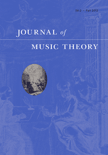
JOURNAL OF MUSIC THEORY
Fostering Excellence in Theoretical ResearchJOURNAL OF MUSIC THEORY is a prestigious academic journal published by DUKE UNIVERSITY PRESS, dedicated to the rigorous exploration of music theory, analysis, and related fields. With an ISSN of 0022-2909 and an E-ISSN of 1941-7497, this journal has gained significant recognition for its scholarly contributions, evidenced by its ranking in the first quartile (Q1) in the field of Music as per the 2023 Category Quartiles. With an impressive position of #33 out of 180 in the Scopus Ranks for Arts and Humanities in Music and standing at the 81st percentile, it is an essential resource for both aspiring and established researchers, professionals, and students. Offering a platform for innovative research from 2002 to 2024, the journal aims to foster a deeper understanding of the complexities of music in contemporary discourse, making it an invaluable tool for anyone invested in the theoretical underpinnings of music.
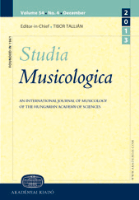
Studia Musicologica
Fostering Insightful Research in the World of MusicStudia Musicologica, published by AKADEMIAI KIADO ZRT, stands as a leading journal in the field of musicology, dedicated to the exploration and analysis of music across diverse cultures and historical contexts. With its ISSN 1788-6244 and E-ISSN 1789-2422, this journal provides an essential platform for disseminating high-quality research and critical analyses, thereby contributing significantly to scholarly discourse in music studies. Although it operates on a traditional access model, its rigor and foundational contributions ensure that it remains invaluable for researchers, professionals, and students alike. Situated in the heart of Hungary, Studia Musicologica engages with a broad spectrum of topics including music theory, ethnomusicology, and music history, fostering a deeper understanding of music's multifaceted role in society. This makes it an essential resource for anyone interested in advancing their research or professional practice within the expansive field of musicology.
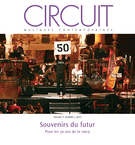
Circuit
Pioneering Insights for Tomorrow's TechnologiesCircuit is a prominent academic journal published by PRESSES UNIV MONTREAL, specializing in the field of electrical engineering and circuit design. With its ISSN 1183-1693, the journal serves as a vital platform for disseminating cutting-edge research, innovative methodologies, and breakthrough technologies that shape the future of circuit theory and applications. Despite the absence of an official impact factor, the journal maintains a commitment to rigorous peer review and scholarly excellence, ensuring high-quality content for its readers. Although it operates under a traditional subscription model rather than Open Access, Circuit is essential for researchers, professionals, and students seeking to deepen their knowledge in circuit engineering and related disciplines. Its position within academic literature makes it an invaluable resource for advancing the understanding and development of electrical systems, highlighting the ongoing importance of this field in a technology-driven world.
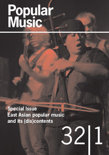
Popular Music
Connecting Music to Global NarrativesPopular Music, published by Cambridge University Press, is a leading academic journal that has been at the forefront of contemporary music studies since its inception in 1981. With its comprehensive scope encompassing a rich diversity of topics within the fields of Cultural Studies and Music, this journal holds a respectable Q2 ranking in both categories as of 2023, underscoring its significant impact on the scholarly discourse surrounding popular music. Researchers, professionals, and students alike will find invaluable insights within its pages as it explores the socio-cultural dynamics of music from various global perspectives. While it is not an open-access journal, the publication aims to foster critical dialogue and interdisciplinary scholarship. Based in the United Kingdom, Popular Music serves as a vital resource for those interested in the intersections of music, culture, and society, sustaining a vibrant academic community through rigorous peer-reviewed articles and reviews. Engage with the latest research and deepen your understanding of popular music's ever-evolving landscape.
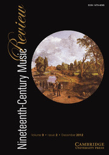
Nineteenth-Century Music Review
Diving Deep into the Rhythms of Cultural ChangeNineteenth-Century Music Review, published by CAMBRIDGE UNIVERSITY PRESS, is an essential scholarly journal in the field of musicology, particularly focusing on the vibrant and transformative period of the nineteenth century. This journal, archived under ISSN 1479-4098 and E-ISSN 2044-8414, serves as an invaluable platform for researchers, professionals, and students alike who are dedicated to exploring the multifaceted interactions between music and society during a time of significant cultural change. With its commitment to high-quality research and critical discourse, it embraces a diverse range of topics, including historical analysis, performance practice, and socio-cultural contexts within music. Operating from the United Kingdom, Nineteenth-Century Music Review is currently categorized in the fourth quartile of music journals according to Scopus rankings, offering a unique opportunity for emerging scholars to contribute to the expanding dialogue in this niche while also reaching a broad audience within the arts and humanities. Although the journal follows a traditional subscription-based model, it continues to be a pivotal resource for academic inquiry and knowledge dissemination in the landscape of nineteenth-century music history.
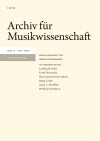
ARCHIV FUR MUSIKWISSENSCHAFT
Exploring the Depths of Music ScholarshipARCHIV FUR MUSIKWISSENSCHAFT, the esteemed journal published by FRANZ STEINER VERLAG GMBH, serves as a significant platform for the dissemination of scholarly research in the field of musicology. With an ISSN of 0003-9292 and an established history of publication reaching back to 2002, this journal aims to explore various aspects of music theory, history, and ethnomusicology, contributing to academic discourse within a vibrant global community. Despite its designation in the Q4 category for music in 2023, the journal continues to foster innovative research and discussions among budding musicians, established academics, and music enthusiasts alike. While Open Access options are not currently available, the journal's offerings are enriched by a thorough review process aimed at maintaining high academic standards. Located in Stuttgart, Germany, at BIRKENWALDSTRASSE 44, D-70191, ARCHIV FUR MUSIKWISSENSCHAFT is committed to engaging its readers through insightful articles and reveals the evolving landscape of music scholarship while remaining a resourceful tool for researchers and students pursuing knowledge in this captivating field.

Opus
Connecting Scholars Through Open AccessOpus is an esteemed open-access journal published by the Associação Nacional de Pesquisa e Pós-Graduação em Música in Brazil, focusing on the field of music studies. With an ISSN of 1517-7017, Opus has been dedicated to fostering innovative research since its inception and has embraced the open-access model since 2009, ensuring that its findings are readily accessible to scholars and enthusiasts globally. The journal has achieved a commendable Q2 ranking in Music as of 2023, showcasing its impact and relevance within the arts and humanities. Although currently ranked #130 out of 180 in Scopus in the music category, Opus maintains a commitment to enhancing the scholarly discourse in musicology through empirical studies, theoretical analyses, and interdisciplinary approaches. The journal's convergence over the years, from 2017 to 2024, reflects its dedication to evolving educational and research methodologies in music. Situated in the vibrant academic landscape of Campinas, SP, Brazil, Opus invites researchers, professionals, and students to contribute to its mission of exploring the multifaceted dimensions of music.